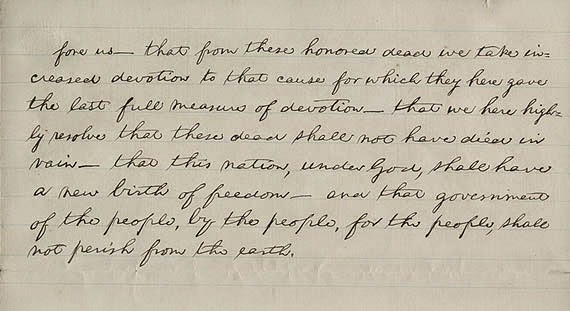272 words (or 269, depending on how you count, and which version you use.)
On November 19th Lincoln traveled to Gettysburg to dedicate the new Union Cemetery
The featured speaker was Edward Everett of Massachusetts, a diplomat, clergyman,
and celebrated orator. The president had been invited
almost as an afterthought to offer a few appropriate remarks. Everett spoke for
not quite two hours.
Then Lincoln rose. The local photographer took his time
focusing; presumably the president could be counted on to go on for a while ... but he spoke just 269 words.
He started off by reminding his audience
that just 87 years had passed since the founding of the nation and then he went on to embolden the
Union cause with some of the most enduring words ever
spoken.
Lincoln was heading back to his seat
before the photographer could open the shutter.
He felt that he had failed, that it was a poor speech, that people
didn't like it. It was so brief, less than two minutes, he felt that he had
failed. His friend, Ward Lehman, was sitting next to
him on the stand when he sat down and there was just a sprinkling of applause.
He said "Lehman, that speech won't scour." That's what you say about the plow in the prairies when the mud won't come off it."
"The cheek of every American must tingle with shame when he reads the flat, silly, dish watery utterances of the man who has to be pointed out to intelligent foreigners as the president of the united states." Chicago Sun-Times
"Dear Mister President, I should be glad if I could flatter myself that I came as near to the central idea of the occasion in two hours as you did in two minutes." - Edward Everett
President Lincoln delivered the 272 word Gettysburg Address on November
19, 1863 on the battlefield near Gettysburg, Pennsylvania.
"Fourscore and seven years ago our fathers brought forth, on this continent, a new nation, conceived in liberty, and dedicated to the proposition that all men are created equal. Now we are engaged in a great civil war, testing whether that nation, or any nation so conceived, and so dedicated, can long endure. We are met on a great battle-field of that war. We have come to dedicate a portion of that field, as a final resting-place for those who here gave their lives, that that nation might live. It is altogether fitting and proper that we should do this. But, in a larger sense, we cannot dedicate, we cannot consecrate—we cannot hallow—this ground. The brave men, living and dead, who struggled here, have consecrated it far above our poor power to add or detract. The world will little note, nor long remember what we say here, but it can never forget what they did here. It is for us the living, rather, to be dedicated here to the unfinished work which they who fought here have thus far so nobly advanced. It is rather for us to be here dedicated to the great task remaining before us—that from these honored dead we take increased devotion to that cause for which they here gave the last full measure of devotion—that we here highly resolve that these dead shall not have died in vain—that this nation, under God, shall have a new birth of freedom, and that government of the people, by the people, for the people, shall not perish from the earth."


No comments:
Post a Comment